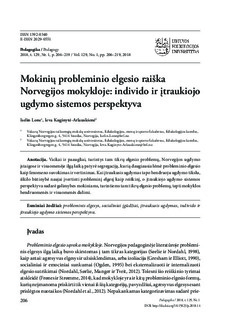Mokinių probleminio elgesio raiška Norvegijos mokykloje: individo ir įtraukiojo ugdymo sistemos perspektyva
Journal article, Peer reviewed
Published version

Åpne
Permanent lenke
http://hdl.handle.net/11250/2582296Utgivelsesdato
2018Metadata
Vis full innførselSamlinger
Originalversjon
Lone, I., & Kuginyte-Arlauskiene, I. (2018). Mokinių probleminio elgesio raiška Norvegijos mokykloje: individo ir įtraukiojo ugdymo sistemos perspektyva [Manifestations of problematic student behaviour in Norwegian schools: Individual and inclusive education system perspective]. Pedagogika, 129 (1), 206-219. 10.15823/p.2018.14Sammendrag
Present research study overviews the manifestations of problematic teenage behaviour in the schools of Norway. In terms of problematic behaviour, a few aspects should be taken into consideration. First of all, it is important to define the problematic behaviour phenomenon. That is not an easy task, because not uncommonly, when analysing manifestations of problematic behaviour, links with emotional disorders are identified as well. In this manner it is almost impossible to separate the two, as well as to foresee the cause and effect relationship. That is why very commonly problematic behaviour ant emotional issues such as social isolation coexists together. Professionals working in Norwegian education system define problematic behaviour as a behaviour related to learning difficulties – that is inappropriate behaviour during classes causing various discipline disorders; provocative/aggressive behaviour, which manifests in physical and verbal attacks towards other individuals; social isolation and severe behavioural problems such as disregard of social norms and rules, stealing, harm-causing physical attacks, constant harassing, missing classes and vicious habits.
Data used in this study was collected during Norwegian national project SPEED (2012–2016), which took place in 95 secondary schools in 16 municipalities and one of the authors master’s thesis was produced on the basis of collected data. During the study, 5–10 grade students and teachers were interviewed and main challenges concerning problematic behaviour in today’s education were characterized, as well as their relationship with social skill development. Analysed data created an opportunity to assess current situation focusing on prevention and individual problem solving method application approaches in individual and inclusive education system perspective, emphasising the relationship between those two. Furthermore, obtained data was compared with the results of prior research studies conducted in Norway, where the relationship between various forms of problematic behaviour and different social skills was previously shown.